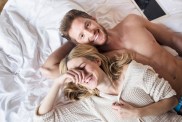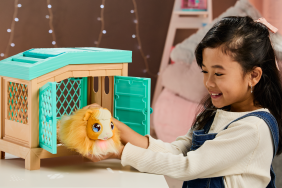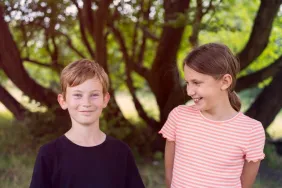When my kids were toddlers we spent hours on what we called “nature hunts.” My goal was to engage their natural curiosity. I would make a list of things they might find along our walk through the park and they would run ahead of me in search of flowers, pine cones, and stones. They would fill their bags with all sorts of natural wonders found along the way and then dump them on the front porch to quiz me about every single item.
They enjoyed our walks so much, because they were curious little beings, just like most other young children out there. Little kids like to make new discoveries and figure out how the world works. Have you ever watched a toddler work tirelessly to stack blocks or cups only to knock them down the moment she finishes stacking them up? Or have you seen a preschooler use a bottle of mustard to make a design all over the table instead of as a topping for his hot dog? This curiosity about cause and effect is the work of childhood.
When parents overschedule their children, however, they run the risk of stifling their kids’ curiosity. Yes, it’s fine to schedule a drawing class for a child who likes art or gymnastics for a child who loves to run and jump. It’s all about moderation though. When little kids are always on the run from one activity to the next they don’t have time to do the things that help them nurture this trait. In time, that natural curiosity fades away.
The good news is that you can take steps to keep curiosity alive, including these:
1. Give your kids plenty of free time to play. While a class here and there can be fun for little kids, the best gift you can give them is time to play without structure or limits. Free play feeds curiosity. When lost in play kids test new theories, make new discoveries, try on new roles, and push their own personal limits. Many children are play deprived. They are doing all kinds of things, but all of those things involve structure, rules, and limits. Kids need time to climb trees, build things out of cardboard boxes, and dig for worms. Make time for play and curiosity will follow.
2. Let them get as messy as they want to during playtime. Speaking of worms, messy play (both indoor and out) plays an integral role in curiosity. My kids love searching for worms after the rain, and they even set up a worm race last summer. Sitting side-by-side in the wet grass and covered head-to-toe in mud, they cheered on their worms as they guided them across the finish line (a twig). I hear from a lot of parents who believe they can leave the messy play for preschool. Some don’t want to deal with the mess while others find it too time-consuming. The truth is that not only is messy play great fun for little kids, but it also leads to problem-solving, improves fine motor skills, and teaches cause and effect. One of our favorite messy play activities is making pretend soup. Using things found in both the yard and the pantry, the kids mix and stir and add new ingredients to try to create a delicious smelling “all-natural soup.” Give it a try!
3. Little kids hear “no” a lot. Say yes more often. As parents we say, “No, you can’t jump from the couch. No, you can’t walk on that wall. No, you can’t climb up the slide.” We set up these boundaries, of course, to protect our children. But, the problem with frequently saying the word “no” is that it conditions kids to stop asking; thus, their natural sense of adventure can be squashed. So, instead, try to say yes to more requests. I like to joke that my daughter is a professional tree climber. If there is a tree nearby, she’s in it. If it’s hard to climb, she’ll find a way. There are times when my smile masks a silent prayer of Please don’t break anything today, but I learned early on to replace words of caution with words of inspiration. “Be adventurous!” I yell, as she climbs just a little too high or goes up the stairs on the outside of the banister. When I step back and say yes, her curiosity soars… and so does her independence.
4. Ask your children more of the right questions. Chances are your kid fires off 10 zillion questions a day in your direction, but how many questions do you ask your child? Parents have a tendency to ask their kids questions that showcase their strengths — as in questions they can definitely answer. Or they ask questions to gain information about the school day. To inspire curiosity, however, parents should ask questions similar to those of their kids. You might, for example, ask something like, “What do you think the birds are looking for in our back yard?” or “If you were a bird, what would you use to build a nest?” When we let our children show us what interests them, we encourage them to continue asking questions and discovering possibilities… and that leads to a lifetime of curiosity.
More Imagination Builders:
- Amazing Sensory Play Ideas (& How Sensory Play Benefits Kids)
- 29 Indoor Games Your Kids Will Absolutely Love
- Fun Car Games That Will Entertain Your Kids for Hours
Photo: Getty








